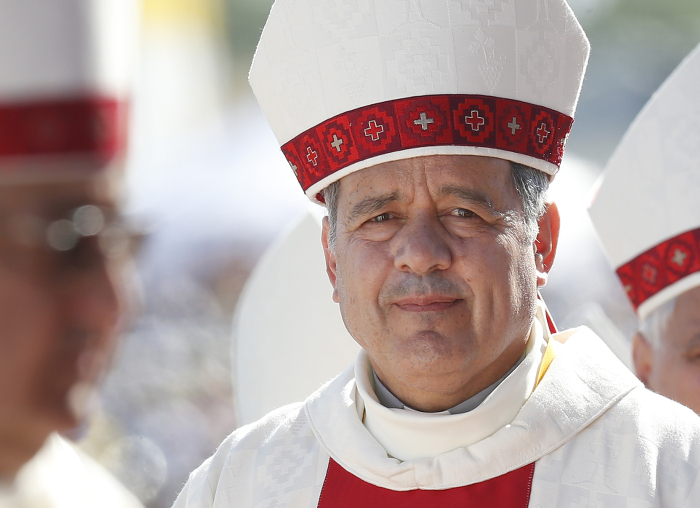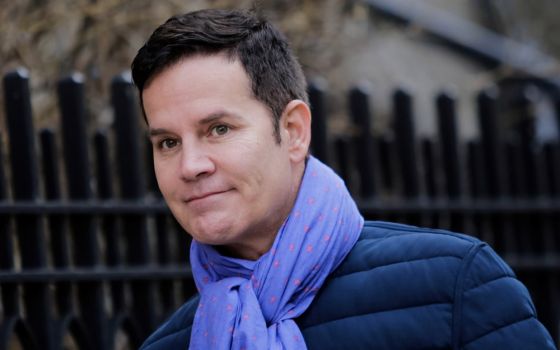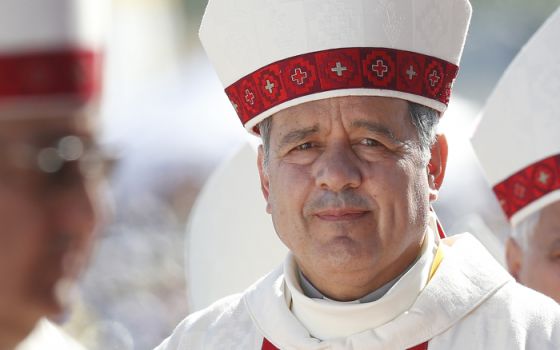
Bishop Juan Barros of Osorno is seen in procession for Pope Francis' celebration of Mass near Temuco, Chile, Jan. 17. (CNS photo/Paul Haring)
Pope Francis has accepted the resignation of the Catholic bishop at the center of Chile's clergy sexual abuse crisis, in the first of what is expected to be a wave of firings to root out what the pontiff has termed a "culture of abuse and cover-up" in the country's church.
In a short note June 11, the Vatican said simply that Francis had accepted the resignation of Osorno Bishop Juan Barros Madrid, a controversial prelate who had been accused of covering up abuse by another priest in the 1980s and '90s.
At the same time, the pope accepted the resignations of two other Chilean prelates who had already reached the traditional retirement age of 75. Francis has named separate apostolic administrators to lead each of the three dioceses on a temporary basis.
Barros' resignation appears to wrap up one part of what has been an unusually tumultuous period in Francis' five-year papacy, which touched off during a January visit to Chile when the pontiff enraged abuse survivors and their advocates by calling the accusations against Barros "calumny."
The pope however made a sharp turnabout after the visit abroad, sending one of the church's most respected abuse investigators to Chile to look into the accusations against Osorno's bishop. In a letter to the country's bishops in April after receiving a 2,300-page report on the situation, Francis admitted making "serious mistakes" in his handling of sexual abuse cases in Chile.
Francis has also met two separate groups of Chilean abuse survivors at the Vatican in the past two months, and held an unusual, three-day group meeting with the country's bishops. Most of the country's active bishops presented their resignations to the pontiff after the en masse encounter.
Juan Carlos Cruz, one of the abuse survivors who met the pope, said on Twitter shortly after the June 11 announcement that Barros' resignation represented "a new day for the Catholic Church in Chile."
The other two resignations Francis accepted are from Puerto Montt Archbishop Cristián Caro Cordero, who turned 75 in February; and Valparaíso Bishop Gonzalo Duarte Garcia de Cortázar, who turned 75 last September.
The pope appointed Our Lady of Mercy Fr. Ricardo Morales Galindo to serve as the administrator for the Puerto Montt archdiocese and Santiago Auxiliary Bishop Pedro Ossandón Buljevic as administrator Valparaíso diocese.
Santiago Auxiliary Bishop Jorge Conchua Cayuqueo will serve as the administrator of the Osorno diocese.
Francis' decision to accept Barros' resignation comes as the abuse investigator he sent to Chile in January, Maltese Archbishop Charles Scicluna, is set to travel back to the country this week to continue his work. The Vatican has said Scicluna is returning this time with the specific focus of meeting with people in Osorno.
Late last month, the pope sent an open letter addressed to "the Pilgrim people of God in Chile" in which he publicly decried "a culture of abuse and cover-up" in the country's Catholic Church.
One of the church's "main faults and omissions," Francis wrote, was "not knowing how to listen to the victims."
Barros is accused of not reporting Fr. Fernando Karadima, a serial sexual abuser who was sentenced to a life of penitence by the Vatican in 2011. Some survivors say that as a priest Barros even witnessed Karadima's abuse of them.
At least three others of the country's current prelates are known to have also been friends with Karadima, like Barros. The June 11 resignations are expected to be the first in a series of resignations as Francis decides how to handle the situation of the Chilean Catholic Church.
Barros had been serving as the head of Chile's military diocese when Francis appointed him to the small diocese of Osorno in 2015. Criticism of the appointment at the time was intense, with some protestors even attempting to interrupt or stop the bishop's installation Mass.
[Joshua J. McElwee is NCR Vatican correspondent. His email address is jmcelwee@ncronline.org. Follow him on Twitter: @joshjmac.]
Advertisement






